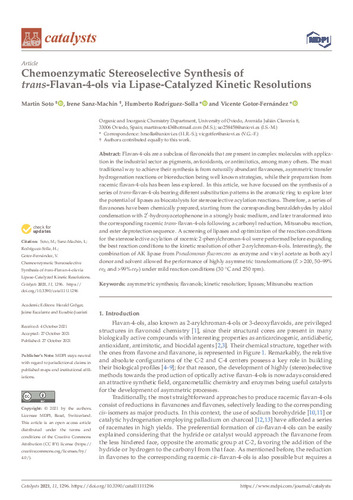Chemoenzymatic stereoselective synthesis of trans-flavan-4-ols via lipase-catalyzed kinetic resolutions
Publication date:
Publisher version:
Citación:
Abstract:
Flavan-4-ols are a subclass of flavonoids that are present in complex molecules with application in the industrial sector as pigments, antioxidants, or antimitotics, among many others. The most traditional way to achieve their synthesis is from naturally abundant flavanones, asymmetric transfer hydrogenation reactions or bioreduction being well known strategies, while their preparation from racemic flavan-4-ols has been less explored. In this article, we have focused on the synthesis of a series of trans-flavan-4-ols bearing different substitution patterns in the aromatic ring to explore later the potential of lipases as biocatalysts for stereoselective acylation reactions. Therefore, a series of flavanones have been chemically prepared, starting from the corresponding benzaldehydes by aldol condensation with 2′-hydroxyacetophenone in a strongly basic medium, and later transformed into the corresponding racemic trans-flavan-4-ols following a carbonyl reduction, Mitsunobu reaction, and ester deprotection sequence. A screening of lipases and optimization of the reaction conditions for the stereoselective acylation of racemic 2-phenylchroman-4-ol were performed before expanding the best reaction conditions to the kinetic resolution of other 2-arylchroman-4-ols. Interestingly, the combination of AK lipase from Pseudomonas fluorescens as enzyme and vinyl acetate as both acyl donor and solvent allowed the performance of highly asymmetric transformations (E > 200, 50–99% eeS and >99% eeP) under mild reaction conditions (30 °C and 250 rpm).
Flavan-4-ols are a subclass of flavonoids that are present in complex molecules with application in the industrial sector as pigments, antioxidants, or antimitotics, among many others. The most traditional way to achieve their synthesis is from naturally abundant flavanones, asymmetric transfer hydrogenation reactions or bioreduction being well known strategies, while their preparation from racemic flavan-4-ols has been less explored. In this article, we have focused on the synthesis of a series of trans-flavan-4-ols bearing different substitution patterns in the aromatic ring to explore later the potential of lipases as biocatalysts for stereoselective acylation reactions. Therefore, a series of flavanones have been chemically prepared, starting from the corresponding benzaldehydes by aldol condensation with 2′-hydroxyacetophenone in a strongly basic medium, and later transformed into the corresponding racemic trans-flavan-4-ols following a carbonyl reduction, Mitsunobu reaction, and ester deprotection sequence. A screening of lipases and optimization of the reaction conditions for the stereoselective acylation of racemic 2-phenylchroman-4-ol were performed before expanding the best reaction conditions to the kinetic resolution of other 2-arylchroman-4-ols. Interestingly, the combination of AK lipase from Pseudomonas fluorescens as enzyme and vinyl acetate as both acyl donor and solvent allowed the performance of highly asymmetric transformations (E > 200, 50–99% eeS and >99% eeP) under mild reaction conditions (30 °C and 250 rpm).
ISSN:
Patrocinado por:
Financial support from the Spanish Ministry of Science, Innovation and Universities (PID2019-109253RB-I00) is gratefully acknowledged.
Collections
- Artículos [37325]
- Investigaciones y Documentos OpenAIRE [8265]
- Química Orgánica e Inorgánica [511]
Files in this item





